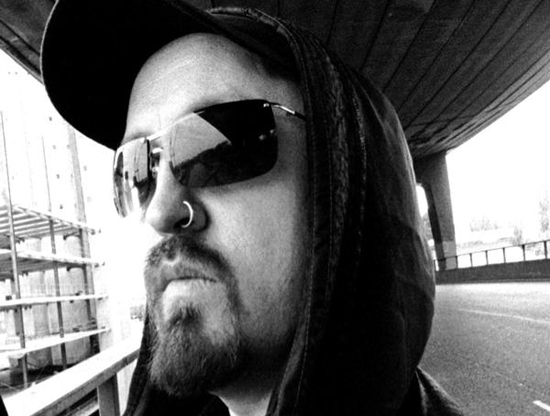"Something’s changed."
Kevin Martin, gently intense, is reflecting over a herbal tea in an east London café.
“I was talking to my flatmate about this recently. She’s an artist at St Martins, and was talking about trying to find her identity – I said ‘yeah, something’s changed’.”
The ‘something’ is the years of relentless and restless musical experimentation through a wealth of pseudonyms and collaborations, many with Justin Broadrick of Jesu. There was the furious free-jazz-rock of God, the organic electricity of Techno Animal’s mutant instrumental hip hop and the hardcore rock-hop of Ice, to name but a few. But with The Bug (excepting the off-kilter debut of Tapping The Conversation), Razor X, Ladybug and the forthcoming long-player from the devastating King Midas Sound, there seems to have been a narrowing down of focus – a thorough dissection of dancehall and bashment that carries those years of diversity as a feeling rather than a sound.
“Now in the last couple of years – it’s taken this long – I can picture what I want and get close to it, whereas in years gone by it was restless experimentation. It’s always the case with me that I’m inspired by technology and by the musical environment anyway, and very obviously London too, so there are key ingredients that push me in certain directions. But recently it’s weird, I feel it myself and now I feel like I know what I’m doing, whereas before maybe I always felt like I was chancing it.”
London Zoo, Quietus album of the year – was it a hard statement to realise?
“Yeah, it was grim – a difficult time personally, economically… To me, Pressure had felt like a really original opening statement and didn’t sound like anyone else, so to have to follow that up was hard enough. And then I was living in the studio for two-and-a-half years, which was pretty horrendous. And then I was just totally knocked sideways by certain tracks that I released were becoming very popular which I’m just not used to at all. Skeng, Jah War and Poison Dart were being picked up mostly with the help of Loefah and Kode9 and I just didn’t expect that at all.
"There was a constant reassessment all the way with where I was going with the record. At the moment I’m working on this record King Midas Sound, and it’s very different, very easy because I know exactly what I want to do with it. I want it to be like entering a zone and I don’t want it to be eclectic or dramatic, just a world that you float in. The Bug album was entirely the opposite to that. I kept changing it as I was going on. At the start I wanted it to be just based around Ras B and Warrior Queen but then I did a session for Mary Anne Hobbs with a lot of vocalists.
In actuality the results of the recorded session were disappointing, it was badly mixed and it didn’t capture the atmosphere in the studio but that was the inspiration to try and get it right for the album. So in the end it was a very long, drawn-out process – I don’t seem to be very good at albums – I can’t just take them for granted and I know people who write very fast but I write so slowly and I curse myself for it."
Do you see Pressure as being an influence on the then-nascent dubstep scene?
“Well I don’t think so, maybe on Kode9 and Spaceape a little bit. I mean, Pressure was a very lonely place; there was no one else really trying to do that. And certainly, no dubstep producers knew who the fuck I was.”
It’s incredible really but nobody had attempted to work with dancehall before other than obviously those directly within that genre.
“Well, it was always a racial no-go zone and then there were people like Shabba and you know, it was just a very hardcore music with hardcore lyrics that intimidated people. To be honest, I hated dancehall for years, I was a real dub snob and was a total wanker about reggae, for years I didn’t want to hear plastic, synthetic sounds. Then I heard this one track by Capleton called ‘Final Assassin’ and just thought ‘Oh wow this is incredible’ and I needed to hear more of it so I just became addicted to buying 7”s. When Pressure came out there was nobody else doing it and there was no audience for it either. I was playing to Rephlex crowds which was an interesting experience because I didn’t know what to expect from that lot as I wasn’t really into that kind of music at all and I was like ‘Woah, what the fuck is this?’ I expected it to be chin-stroking nerds and it was actually full of young student druggies who wanted to get fucked up by sound. I still don’t think they were quite getting it, I think they saw us as some kind of novelty act, me, Ras B and Warrior Queen. I mean with dubstep, for sure it’s helped me and there is a crossover there although I don’t really have a relationship with it. I have a lot of time for the first wave of producers, I think they were doing incredible stuff but I think now that it’s become a victim of its own success.”
But you don’t feel as isolated as you used to?
“No no of course not, it’s been a really good time for me, really positive and the other thing is that dubstep has tuned an audience to the same influences that I have. And this has tuned promoters in to better sound systems with extra bass and sub bass, which used to be impossible.”
We talked about the eclectic and superb Brainfeeder night that had taken place earlier in the year with Flying Lotus, Kode9, Rustie and MoHawke and the proliferation of nights now that encompass an eclectic mix of different sounds but somehow manage to follow a thread as well. This is also being reciprocated in the States at the same time, which also feels like a first.
“I think the internet has changed everything. When jungle was around, the ‘net wasn’t really happening. I remember when I did my first tour of America it was astounding.
I was really shocked at how well the music was received and how popular it was and there were roadblock shows! The promoters are really into club music or dubstep music and they really want to push that sound in a really evangelical way and that surprised me a lot. The internet and the whole accelerated information wire is changing the whole spectrum of music – how it’s taken in and how it’s distributed. This year I’ve found myself being taken in by really disparate groups who I never would have expected to appeal to. For the first time in my life I feel like I’m in the right place at the right time.”
Nearly a decade ago, you compiled a series of magnificent compilations for the Virgin Ambient series Isolationism which was a very early exploration of dark ambient, Macro Dub Infection Volumes 1 & 2 which examined dub in a Burroughsian viral sense, infecting everyone from Coil to Tortoise and the Jazz Satellites, which took in a variety of obscure, mutated pieces ranging from Miles Davis to The Pop Group and Kraftwerk in the earlier Organisation form. Do you listen as widely now?
“In the last year-and-a-half that’s been really hampered and then when I do go looking there’s not that much that inspires me. The two things that were consistently amazing for me for the last seven or eight years were hip hop and dancehall, and both seem to be at crisis point right now. I’m not hearing much out of either area that I like. But then, if I’m not hearing what I want then I want to make it myself which will be the mission for the next Bug record. And I really miss vocals on all the bleepy, wonky stuff. There are a couple of tracks on the album that are more polyrhythmic and up-tempo and less… crushing, lets say. And I don’t want to make another London Zoo anyway. Over the last two albums, I feel like I’ve been writing songs, which is something I’ve never really done before.”
I suggest that with the few King Midas Sound songs that I’ve heard that he seems to be moving in an even more crafted, structured and melodic direction despite how out-there the productions sound.
“Well, for many years I hated songs and I hated melody but this suddenly felt like a real challenge and then I realised it could have an even sicker effect, even more perverse by adding twisted sounds into the song format.”
‘Fuckaz’ with Spaceape was particularly effective on London Zoo I thought…
“Well, he’s incredible. And I think he’s pushing what Roger [Robinson] used to do onto the next level, where Roger doesn’t want to write poetry anymore. So it’s more sci-fi, more intense. In fact I’m working with Spaceape on a series of singles for Soul Jazz called ‘Cult Of The 13th Hour’ and I’m encouraging him with each one to try and become militant lyrically but the music is very hooky and dancefloor so again we’re looking for this contrast whereby the music is irresistible and the lyrics are detestable. Obviously with Kode9, it’s a lot more abstract and conceptual. But anyway, for me, Memories of The Future is one of the best albums of the last few years.”
Spaceape really seems to divide critics.
“He seems to get dissed on dubstep forums for being too intellectual but that’s not me and how can that be a criticism, are you not supposed to have a brain?”
For somebody who has always been pioneering and especially after the hardships of producing London Zoo, does the future suddenly feel a little more wide-open?
“For me, it’s always about what’s next. Move on, move on and the day I stop being inspired and thinking about the next record is the day I should give up.
And I’d be a fucking liar to say that it’s not a tremendous boost to get such a positive response. For years I hated audiences and hated being on stage. With God it was about confrontation and fucking people off and now I’m interested in fucking with people but not fucking them off which is something totally different. And I’m being able to make music without any form of compromise; I can just do whatever I want.”
And we want to hear it. London Zoo may have ruled 2008 but believe me, this might just be the beginning. King Midas Sound has the potential to tower way over that. Out of the wilderness, no longer in isolation, the most far-reaching parts of this decade may come to be defined by a former sax-blowing, larynx-shredding noise-freak. Now that’s something to bug about.



